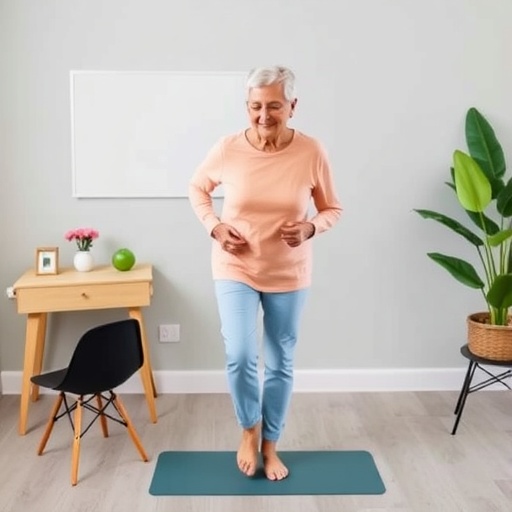In the ever-evolving landscape of geriatric health, the issue of dementia remains one of the most pressing challenges. As the population ages, healthcare professionals are confronted with the need to adapt existing methodologies to cater specifically to individuals grappling with dementia. A recent study by Barisch-Fritz et al., published in BMC Geriatrics, explores this adaptation, focusing on physical performance tests tailored for assessing balance, mobility, and lower limb strength in dementia patients. This innovative approach is crucial as it addresses a gap in previously established protocols that often overlook the unique requirements of those with cognitive impairments.
The study meticulously examines how traditional physical performance metrics may not accurately capture the functional capabilities of individuals with dementia. The authors argue that without accommodation for dementia-specific factors, the reliability of performance tests can be compromised. This is particularly concerning given that balance and mobility are critical indicators of overall health and independence in older adults. The implications of this research could significantly alter current evaluation practices and enhance intervention strategies targeted at this vulnerable population.
A diverse cohort of participants was recruited for the study, comprising individuals diagnosed with varying stages of dementia. The researchers employed a series of physical tests typically used in geriatric assessments. However, these tests were modified to better align with the cognitive limitations faced by dementia patients. The adaptation involved simplifying instructions and enhancing visual cues during the tests, which allowed for a more accurate assessment of the participants’ mobility and strength.
One of the primary outcomes of the study highlighted the improved reliability of the adapted physical performance tests. By aligning testing requirements with the cognitive abilities of the participants, the researchers observed a marked increase in consistency and accuracy of results. This suggests that such tailored adaptations not only enhance the validity of assessments but could also lead to more personalized care plans for those living with dementia.
Another significant finding was the correlation between physical performance and the quality of life among dementia patients. As balance and mobility improve, so too does the overall well-being of individuals. This link underscores the importance of incorporating physical activity into dementia care regimens, as it can mitigate some of the debilitating effects of the disease. The authors advocate for integrating these adapted tests within routine clinical settings to monitor progress and adjust interventions effectively.
The research is timely, considering the growing demographic implications of dementia. As rates of diagnosis continue to rise globally, the healthcare system must evolve to address the complexities of care. By refining the tools available for assessment, practitioners can better understand the limitations and capabilities of their patients, paving the way for more effective treatment strategies.
Moreover, the study opens the door for further research into additional adaptations needed to address other common challenges faced by dementia patients. Investigating how environmental factors, such as home settings or community resources, interact with physical performance could provide a more comprehensive understanding of the care landscape. Future studies may explore how these adaptations can be standardized across various healthcare settings, ensuring all dementia patients receive the best possible evaluations and interventions.
Equally important is the engagement of caregivers and family members in this new paradigm of care. The research highlights the critical role that social support plays in maintaining mobility and strength in dementia patients. Educating caregivers about the physical assessments and the significance of mobility can empower them to actively contribute to the well-being of their loved ones. This collaborative approach not only fosters a better support system but also enhances the overall care experience.
Health professionals responding to this study are optimistic about its implications. With dementia care needing a more individualized approach, these findings may catalyze a shift in how physical performance tests are employed across various healthcare settings. As professionals begin to implement these adapted tests, continual feedback from both patients and caregivers will be essential in refining the processes and ensuring their effectiveness.
The versatility of the findings may even extend beyond dementia, enriching physical performance testing methodologies in other populations with cognitive or physical impairments. As more studies recognize the necessity of customizing health assessments to suit patient needs, the overall quality of geriatric healthcare can be expected to improve.
Ultimately, Barisch-Fritz et al.’s work serves as a significant contribution to the body of knowledge surrounding dementia care. It emphasizes the importance of developing comprehensive frameworks for assessing and enhancing the physical abilities of this unique patient group. The study not only highlights the need for practical adaptations but also calls for a broader dialogue about the intersection of cognitive health and physical performance.
In conclusion, while the challenges posed by dementia are many, advancements such as those presented by Barisch-Fritz and colleagues demonstrate that tailored interventions can lead to positive outcomes. By fostering an environment where physical health assessments are informed by the cognitive realities of dementia patients, healthcare providers can implement strategies that truly resonate with the needs of this population. This pioneering research is just the beginning of an essential voyage towards enriched, person-centered care.
Subject of Research: Dementia-specific adaptations to physical performance tests
Article Title: Dementia-specific adaptations to physical performance tests of balance, mobility, and lower limb strength and function: a reliability study in people with dementia.
Article References:
Barisch-Fritz, B., Krafft, J., Krell-Roesch, J. et al. Dementia-specific adaptations to physical performance tests of balance, mobility, and lower limb strength and function: a reliability study in people with dementia. BMC Geriatr 25, 908 (2025). https://doi.org/10.1186/s12877-025-06710-1
Image Credits: AI Generated
DOI: https://doi.org/10.1186/s12877-025-06710-1
Keywords: Dementia, physical performance tests, balance, mobility, lower limb strength, reliability study, geriatric care.
Tags: adaptive methodologies in dementia carebalance tests for elderlyBarisch-Fritz study on dementiacognitive impairment and physical performancedementia mobility assessmentdementia-specific assessment protocolsfunctional capabilities of dementia patientsgeriatric health challengesimproving independence in older adultsinnovative research in geriatric carelower limb strength evaluationtailored interventions for dementia patients





